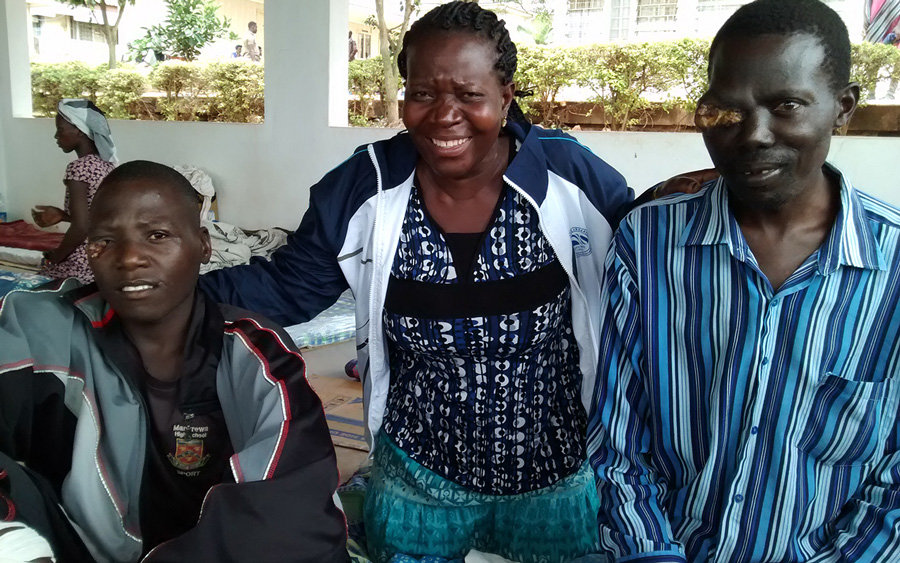A medical doctor from Denmark shares her gifts as a Maryknoll affiliate in Africa
As the volunteer staff doctor at Rays of Hope Hospice in Jinja, Uganda, I was in a quandary on a recent Monday morning. We had six cancer patients needing medical treatment at the national hospital in the capital of Kampala, but we couldn’t afford to send them there. Then, miraculously, a donation arrived. One of the patients, Beatrice, cried for joy when we told her she and the other five could go to Kampala.
It didn’t take me long to figure out that the anonymous donation was from Maryknoll Father John Barth. He and the other Maryknoll missioners I first met in Cambodia have been real gifts to me in ways far beyond donations. They have taught me to see the face of Christ in the suffering people in front of me and inspired me to use my own gifts wherever I am as a Maryknoll affiliate.
It was 1996 when my husband Ken Davies and I moved to Phnom Penh, Cambodia, with our four children, and the fifth on the way. As director of the U.N. World Food Program, Ken had been assigned to this Asian nation, struggling to rise from years of war and genocide under the Pol Pot regime of the late 1970s.
Right from the first Mass I attended with the Maryknoll community, I knew that being part of it was going to be something special. Father Barth together with Fathers Jim Noonan and Charlie Dittmeier and Sisters Luise Ahrens, Regina Pellicore and Joyce Quinn were leading a truly ecumenical congregation of Catholics and others who cherished celebrating the Eucharist together and receiving inspiration for living, loving and serving God and one another.

At the national hospital, Zaina (c.) is a “guardian angel” to patients from Jinja such as these two young men
It was not only the life-giving Mass that drew me to this community but also being part of their ministry. As a doctor, I worked with Father Noonan at Seedling of Hope, a Maryknoll program he had started for people living with HIV/AIDS. That was before treatment for HIV/AIDS was available, so we could only treat the opportunistic diseases. But Father Jim showed me how love and respect for each life can also heal. Some patients actually gained weight and new strength through the love and care we were able to provide. Still many of our clients died, but they died knowing that they were loved.
Our clients were among the very poorest in Phnom Penh, who needed a way to earn an income. So we started Patches of Hope through which we taught our stronger clients to make quilts using the many scraps available from the local textile factories. Father Barth’s order for the first 50 quilts for his patients at Takao Eye Hospital in Phnom Penh got the project off to a flying start. Later he organized the transport and sale of the quilts in the United States, with assistance from some dedicated Maryknoll affiliates.
After four years in Cambodia, I was devastated when my husband was transferred to Uganda. The thought of leaving behind my Maryknoll work, friends and support was not easy. Father John encouraged me, saying that God had something special in mind for me and that I would be ready to take up the task. He was right.
I have been able to initiate programs for people with HIV/AIDS that are based on the same love and respect for the individual client that Fathers Noonan and Barth taught me. In Uganda the initiative was Reach Out Mbuya Parish HIV/AIDS, a holistic, community-based program that now serves more than 6,000 clients. Later, in Mozambique, I started Pinta Vida, an income-generating sewing workshop for poor women living with HIV/AIDS.
Last year my husband retired from the World Food Program. It seemed only natural for us to move back to Uganda, where so many poor people still need help. With the Reach Out Mbuya project now in capable local hands, I decided to use my medical skills as a volunteer at Rays of Hope, Hospice Jinja. Here we have more than 400 clients, who are suffering from cancer and/or AIDS and other painful conditions. Many have treatable problems, like 29-year-old Leyah Kiwala, who was suffering from a disfiguring tumor in her mouth. After successful surgery at the national hospital in Kampala, she is now able to resume a normal life.
At the national hospital, we are fortunate to have Zaina, a volunteer who worked with me at Reach Out and helps patients navigate the hospital’s maze of paperwork and protocol. Zaina is like a guardian angel for our clients.
My work presents a wonderful opportunity to help those in need, one person at a time. The absolute poverty and isolation of our clients means that Hospice Jinja is often their only hope for treatment and care, making our work an immense and crucial challenge, but seeing people like Leyah restored to health makes it all worthwhile.
It is now 20 years since I first met Maryknoll in Phnom Penh. Each Maryknoller has been a stone that has created so many ripples in the water of my life. I am happy and grateful to consider myself one of them.
